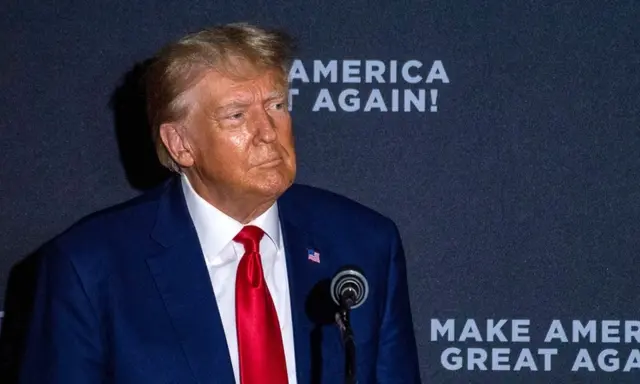ATLANTA—In a bizarre turn of events, a Georgia court briefly posted online—then removed—a two-page list of charges against former President Donald Trump on Aug. 14.
The posting (pdf), first reported by Reuters, came amid reports that a grand jury in Fulton County, Georgia, was still hearing testimony from witnesses regarding President Trump’s challenge of the 2020 election results and his attempts to remain in office after Democrat Joe Biden was declared the victor.
The apparently premature release of the expected charges touched off concerns about the accusations possibly being predetermined before the grand jurors voted.
Reuters reported that the county’s website deleted the document from public view “without explanation” and that the Fulton County District Attorney’s Office said that no charges had been filed against President Trump. The Epoch Times has not been able to verify the origins of the document and whether it was posted on the court’s website.
The Epoch Times has sought comment from a spokesperson for District Attorney Fani Willis.
As news about the posted-and-deleted charges surfaced, reporters were gathered on two sides of the Fulton County Courthouse, awaiting confirmation of the grand jury’s activities and keeping their eyes peeled for grand jury witnesses to emerge.
“They’re moving faster than they thought,” Chidi wrote on X, formerly known as Twitter.
Later in the afternoon, the Fulton County Superior Court said that no documents had been filed that day regarding the grand jury investigation into President Trump’s efforts to dispute the election in Georgia in 2020.
“Documents that do not bear an official case number, filing date, and the name of The Clerk of Courts, in concert, are not considered official filings and should not be treated as such,” the clerk’s office said in a statement.
The office called the sheet circulating online a “fictitious document.” It did not, however, confirm if the document was posted to its website.
President Trump’s attorneys responded to the report of the brief posting, arguing that the incident represented the “pervasive” violations in how the investigation has been handled for the past two-plus years.
“The Fulton County District Attorney’s Office has once again shown that they have no respect for the integrity of the grand jury process,” lawyers Drew Findling and Jennifer Little said in a statement issued by the Trump campaign.
“This was not a simple administrative mistake,” the attorneys added. “A proposed indictment should only be in the hands of the District Attorney’s Office, yet it somehow made its way to the clerk’s office and was assigned a case number and a judge before the grand jury even deliberated. This is emblematic of the pervasive and glaring constitutional violations which have plagued this case from its very inception.”
List of Charges
If the charges are approved as stated in the document, President Trump would be accused of 13 offenses.
Based on count numbers listed in the document, at least 39 total charges would be filed in the planned indictment, but 26 missing counts apparently involve other defendants whose identities are not provided in the document that Reuters obtained.
The first charge against President Trump lists racketeering in connection with an incident on Nov. 4, 2020—a day after the 2020 presidential election.
Six additional charges stem from actions allegedly taken on Dec. 6, 2020: conspiracy to commit impersonating a public officer, and five counts of conspiracy to commit forgery or other false documents, statements, or writings.
Another charge alleges “solicitation of violation of oath by public officer” on Dec. 7, 2020.
The next alleged incident, involving filing false documents, relates to Dec. 31, 2020.
Two charges—solicitation of violation of oath by public officer and false statements and writings—are tied to a now-infamous phone call that President Trump had with Georgia Secretary of State Brad Raffensperger. During that call on Jan. 2, 2021, President Trump disputed the election results and claimed that votes fraudulently cast for then-candidate Biden accounted for his deficit of fewer than 12,000 votes.
Finally, two counts of those same charges stem from actions alleged to have occurred on Sept. 17, 2021.


